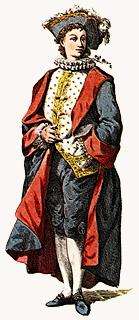Lélio (Commedia dell'arte)
Lélio is a stock character of the commedia dell'arte.

Lélio. (Maurice Sand, Masques et bouffons (comédie italienne), 1860.)
Lélio represents the happy innamorati, loved by the woman he loves (often Isabella), always friendly, gay, cheerful, with a hint of comic.
Several actors played the role in Paris, particularly Luigi Riccoboni who gained great successes with the part due to his talent, grace, elegance and happy countenance, as well as his son Antoine-François Riccoboni, called "Lélio fils".
Molière introduced the figure of Lélio in two of his comedies, l'Étourdi and The Imaginary Cuckold. Marivaux used it in his Surprise de l'amour and his Prince travesti.
Being of aristocratic rank, his outfit is highly sought as a court dress.
Sources
- Arthur Pougin, Dictionnaire historique et pittoresque du théâtre et des arts qui s’y rattachent, Paris, Firmin-Didot, 1885, (p.468-9).
gollark: There are things other than those which matter? Also, subsistence farming is kind of no?
gollark: Oh, so you assume anarchocapitalism will magically lead to hyper-advanced technology which will allow you to trivially make anything at home.
gollark: Why would cities not be needed? They seem useful for, well, having people work close together to save on commute times, I guess?
gollark: Which you also can't do.
gollark: You can't just magically live off a garden very well. Especially in cities.
See also
This article is issued from Wikipedia. The text is licensed under Creative Commons - Attribution - Sharealike. Additional terms may apply for the media files.